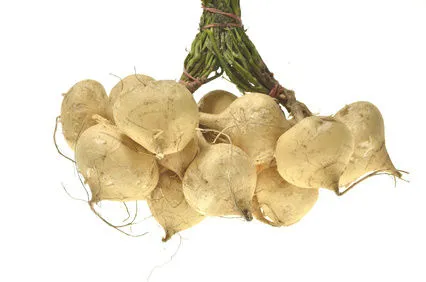
- Share on Facebook58
- Share on Pinterest
- Share on Twitter
Jicama (Pachyrhizus erosus) is a root vegetable that you may not have heard of before. Also known as the Mexican yam, the Mexican turnip and the Mexican water chestnut, jicama is actually a member of the bean family, and has some very notable nutritional qualities.
This delicious and versatile veggie contains inulin, which is a prebiotic that promotes “good” gut bacteria. By increasing healthy bacteria in your gut, prebiotics can greatly improve your digestion, as well as prevent or reduce a wide range of digestive distress symptoms. A 2005 study published in the British Journal of Nutrition also linked inulin to a reduced risk of colon cancer.
Jicama is high in vitamin C, which is very important for optimal immune system health. Vitamin C can help wounds heal faster, and increase your skin’s production of collagen, leading to a healthier, younger-looking and vibrant complexion. Higher collagen production also means less wrinkles.
Along with boosting digestive, immune system and skin health, jicama also contains B-vitamins, and the essential minerals copper, iron, magnesium and manganese. These help all of the body’s systems function properly.
Jicama has a mild flavor, and can be added to salads and stir-fries raw, or baked in the oven and mashed into a delicious puree—among many other creative serving options. However, only the root of the plant is edible, the rest of the plant is toxic, so make sure that you peel it well.
 Your quest for fresh jicama may end at your local farmer’s market (depending on where you live), your organic grocer, or your local Mexican grocer. While it may not be as easy to find in the standard grocery store produce section, the health benefits of this veggie are worth the search.
Your quest for fresh jicama may end at your local farmer’s market (depending on where you live), your organic grocer, or your local Mexican grocer. While it may not be as easy to find in the standard grocery store produce section, the health benefits of this veggie are worth the search.
-The Alternative Daily
Sources:
http://www.nutrition-and-you.com/jicama.html
- Share on Facebook58
- Share on Pinterest
- Share on Twitter

